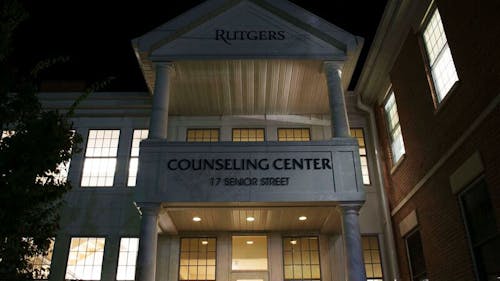Psychological services at Rutgers are 'easily overwhelmed,' Barchi says

From intake appointments to individual and group therapy sessions, Rutgers students made roughly 30,000 visits to the counseling centers on campus last year.
In the face of this steadily increasing number, however, it has come to light that the University may not be capable of offering comprehensive long-term support to every single student that needs it.
University President Robert L. Barchi told The Daily Targum earlier this week that the 5.5 percent uptick in intake appointments at Rutgers is indicative of a national mental health trend — one that most universities do not have the resources to handle.
He said that more and more incoming students come to the University with a history of interacting with psychological services and therefore, when they begin classes, they turn to the Center for Counseling, ADAP and Psychiatric Services at Rutgers for help.
“We don’t have the resources to do that, so we are easily overwhelmed,” Barchi said. “Our psychological counseling services are really triage services and we can provide services for a finite period of time and then the students have to be out in the community. We can’t be used as the service — we can’t possibly do that.”
CAPS programs generally consist of six sessions, after which students are encouraged to go elsewhere for long-term treatment, according to a task force report by the Rutgers University Student Assembly (RUSA).
“We are trying as best we can to augment the staff that do the acute triage intake and first care and even that is a challenge — but look, it is no worse of a challenge here than it is at any other University whose presidents I have talked to. It's just a national problem,” Barchi said.
In recent years, CAPS has expanded its services by hiring more clinical psychologists, diversifying group therapy options and launching an initiative entitled “Let’s Talk,” where students can drop-in at various locations around campus and speak with a licensed counselor.
Earlier this week, RUSA took a major step forward by making it possible for students to schedule their intake appointments online, through the Student Health Portal.
Prior to this development, individuals looking to get started at CAPS would either have to call or walk into the building on Senior Street.
“Making that call is sometimes the hardest part,” the assembly’s announcement reads. “Now you don’t have to.”
Evan Covello, the president of RUSA, said the new online appointment feature was built through a strong partnership between CAPS and the student body. After speaking to individuals around the University, it became clear to him that addressing mental health on campus would require the assembly to first tackle the stigma surrounding the subject.
"We have made addressing campus mental health a top priority," Covello said in an email. "We have built a very strong partnership with CAPS over this past year to implement changes that students have been asking for... There is still an undeniable stigma that exists, and with that, we want to ensure that all students feel comfortable setting up an appointment for counseling."
Earlier this semester RUSA also put together a Town Hall that featured a panel of representatives from various student resources and organizations — all of which specialized in different aspects of mental health. This town hall gave students a chance to voice their concerns directly to CAPS while learning about the vast array of crisis lines and support networks available at Rutgers.
“It is no secret that the demand for mental health services goes up every year," Covello said. "One reason for this may be that efforts to end the stigma associated with mental health are working. We need to continue those efforts, but we also need to continue to advocate for more resources, through our own university, and even our government. There is nothing more important than ensuring the well-being of our students. Quality mental health services on our campus is a critical part of that.”
In its ongoing effort to bridge the gap between students and administrators, RUSA formed a task force in 2016 to investigate the state of mental health services on campus at Rutgers.
In their first report, the Mental Health Task Force found that roughly 81 percent of students on campus are aware that CAPS exists. Just over 56 percent of respondents said they would be “willing to access a confidential drop-in session for mental health concerns."
Covello is currently looking to address the policies around mental health-related absences from class while still pushing to cultivate a culture where mental health stigma no longer exists.
“Eliminating the stigma is something that we can only achieve together as an entire community,” Covello said. “In conversations about the resources we have available, we need to be reminded that we have each other. All of our students need to support each other and continue to ask the simple question of how are you. The day to day interactions we have with each other can make a great difference in someone’s life.”
Kira Herzog is a School of Arts and Sciences junior majoring in political science and journalism and media studies. She is the news editor for The Daily Targum. Follow her on Twitter @kiraherzog1 for more.



